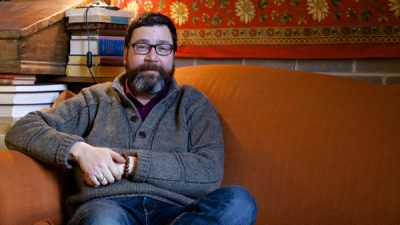By Dario Balca, TLS staff writer
Front to back, page by page, line by line—this is how Carleton humanities professor Gregory MacIsaac teaches his students some of the most challenging texts history has to offer.
It’s all part of the award-winning professor’s unique approach to teaching what he calls “holistic” reading. This means studying and analyzing texts in their entirety rather than picking and choosing sections or pieces of information.
MacIsaac says this approach is necessary to really understand philosophy.
“What you want is to show (students) what it’s like to get inside the book, inside the argument,” he says. “Instead of cramming as much into a course as we could, we have them read fewer things, but we have them read all of it when possible.”
A professor at Carleton’s College of Humanities since 1998, MacIsaac usually teaches the second-year course “Reason and Revelation.” The reading list includes Plato’s The Republic, Aristotle’s Ethics, and Dante’s Divine Comedy.
Two years ago, he developed HUMS 1200, a course aimed at teaching students how to read and write in a way that will help them be successful. Before, he was trying to teach philosophy and writing simultaneously in his second-year course.
“What I realized is that we’d never taught writing,” he says. “We just had students read quite difficult books, then set them papers.
“I can teach my second year course at a much, much higher level now.”
The 45-year-old is also writing a guide for students on how to navigate philosophy texts that he hopes to finish this year.
MacIsaac’s teaching innovations haven’t gone unrecognized. In 2011, he was awarded the Provost’s Fellowship in Teaching Award for sustained excellence in teaching, the Faculty of Social Sciences Teaching Award, and several other accolades.
A native of Antigonish County, N.S., MacIsaac says his interest in philosophy began in high school and later led to an undergraduate degree in classics from Dalhousie University and graduate studies at Notre Dame University.
These days, MacIsaac’s own research is aimed at finding new ways of reading Plato—one of the authors he first fell in love with.
“When I started reading Plato, I was blown away because I was thinking for the first time in my life, not just taking for granted how the world is, but really considering that things could be otherwise,” he says.
Although his teaching style has changed in his 17 years at Carleton, MacIsaac says his aim has always been to help students think this way.
“I think our society places far too high a value on usefulness,” he says. “There is such a thing as sitting back and just thinking about what makes life good, and people who study philosophy and literature and history—it’s our job to think about that stuff, and it’s really important.
“Thinking is just inherently enjoyable and enriching.”
